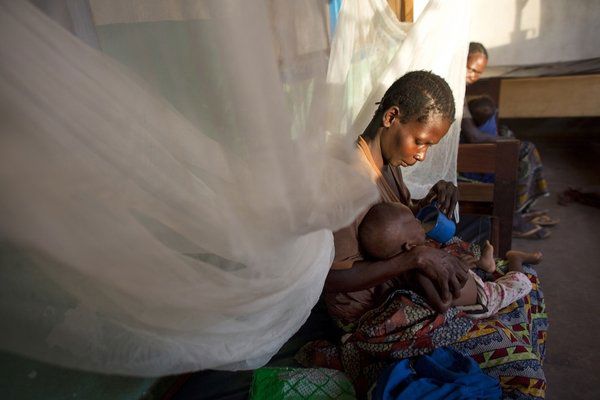Three months after a coup d’etat in the Central African Republic, Medecins Sans Frontieres (MSF) continues to scale up activities to respond to ten of thousands of people who have been left without access to basic healthcare. MSF has opened a new emergency health project in Bossangoa, north of the capital, Bangui, where staff is holding more than 300 out-patient consultations per day. MSF teams are also holding mobile clinics in a number of districts where the population is still hiding in the bush, due to the presence of armed men.
In Bossangoa, MSF is responding to an acute lack of health care for approximately 150,000 people after some health care workers in the town fled their posts. The focus is on treatment of malaria, diarrheal diseases, malnutrition and sexual and gender based violence. To date, 53 percent of children under the age of five, seen in the out-patient department, have been confirmed with malaria. 50 percent of pregnant women receiving ante-natal care have also been diagnosed with the disease. This week MSF is beginning a two month emergency initiative to provide anti-retrovirals drugs to HIV/AIDS patients at the Bossangoa hospital who have been without drugs since the crisis.
“There are approximately 11,000 HIV positive people in CAR who have had their treatment interrupted due to a lack of drugs which were looted during the political upheaval, says Chury BAYSA, MSF Medical Coordinator. This initiative reflects MSF’s ongoing commitment to patients to improve their health and reduce the suffering and mortality due to HIV/AIDS.”
Ministry of Health officials estimate there are approximately 310 HIV/AIDS patients who were registered in the Bossangoa hospital program before the coup, 170 of whom were on ART and approximately 140 who were pre-ART patients. In the last two weeks 88 patients have approached staff at the hospital asking for drug refills.
At MSF’s project in Batangafo, in the northwest, teams are assessing a situation where approximately 8000 people who were displaced in April when more than a dozen villages were burned down as a consequence of clashes between the local population and a nomadic group from Chad. Next week, teams will start mobile clinics in the areas where internally displaced people are congregating and carry out a distribution of non-food items, including mosquito nets, blankets and soap.
Relative calm has now returned to Bangui where MSF has just ended its three month emergency response at the Community Hospital. The MSF team provided treatment to 1,072 patients; 36% of whom were suffering from bullet wounds and 149 patients who required surgery. Activity at the hospital is now back to normal as staff who fled during the coup have returned. The operating theatre and sterilization unit are now properly fitted out and the team has pre-positioned supplies of drugs in case of need.
But, as the malaria season begins in CAR, there is fear the already high mortality rate will escalate because most of the country is without any medical assistance. “The health challenges in CAR are huge, especially outside the capital, where the healthcare system has been weak for many years. This is a crisis on top of a crisis. The biggest needs are access to basic healthcare, including adequate amounts of drugs in the health facilities. Import into the country and distribution throughout the country are the biggest bottlenecks, says Ellen van der VELDEN, MSF Head of Mission. We are calling on other non-governmental organisation, donors and the United Nations to come into the country to help the population.”
MSF has worked in the Central African Republic since 1996 and has projects in Batangafo, Boguila, Carnot, Kabo, Ndele, Paoua and Zemio.


